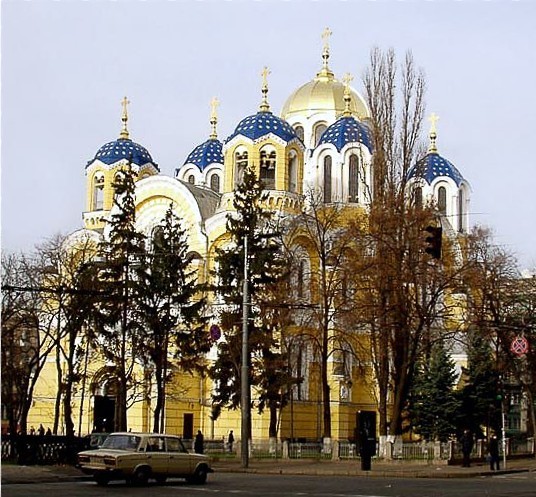Saint Volodymyr's Cathedral
Saint Volodymyr's Cathedral (Volodymyrskyi sobor; Sobor sv. Volodymyra). (Photo: Saint Volodymyr’s Cathedral.) A cathedral in Kyiv, built between 1862 and 1896. Its interior wall paintings and Byzantine revival architecture reflect some of the major currents in Ukrainian art and architecture of the middle and late 19th century, a period characterized by national rediscovery and the Romantic revival of historical styles.
The cathedral has an elongated cross-in-square plan. Three naves spring from apses in the east and are intersected by five transverse aisles. The apses and the first east aisle form the sanctuary. The next aisle, wider than the others and similar in dimension to the central nave, forms the transept. The westernmost aisle forms the narthex. There are balconies over the side naves and west aisles. The cathedral is topped by a series of Byzantine-like domes and barrel vaults corresponding to the plan divisions below. A large central dome on a tall drum is located over the crossing and is surrounded by four smaller domes over the adjacent side naves. Two short towers with domes are located over the narthex. The exterior walls are heavily loaded with ornamentation and marked with buttresses and three squat entry pavilions, one attached to the narthex, and the other two to each of the transepts.
In the stylistic treatment of the cathedral, its architects hoped to renew the traditions of Kyivan Rus’ architecture, but the result is an eclectic and Romantic rather than authentic version of the architecture of Byzantium or Kyivan Rus’. In the exterior ornamentation, for example, motifs have been borrowed from many Eastern sources, most apparently from the Byzantine church architecture of early Bulgaria.
Aleksandr Beretti is generally credited with the cathedral's final design, but because of many problems, especially shortages of funds and, later, structural defects, many other architects were involved before and after him. The first design, a wider cross-in-square plan with 13 domes, was prepared by I. Shtrom in 1859. This design was altered in 1861 by P. Sparro, who made a narrower plan with seven domes. In 1862 an essentially new design was prepared by Beretti. Full construction finally began in 1872. In 1875 R. Bernhardt made significant structural revisions to the design, and in 1876 Vladimir Nikolaev was given the responsibility of overseeing the project to its final completion.
The paintings and decorations, executed between 1885 and 1896 by many leading Ukrainian and Russian artists, loosely follow the pictorial program of Byzantine art and church decoration. The Russian painter V. Vasnetsov, together with teachers and pupils of the Kyiv Drawing School (eg, Serhii Kostenko, O. Kurinny, Mykola Pymonenko, Viktor Zamyrailo), is responsible for much of the work, most notably The Baptism of Volodymyr, The Baptism of Rus’, The Blessedness of Paradise, and paintings on the columns and pilasters. By far the most striking is Vasnetsov's Mother of God in the central apse, a monumental mural charged with mystery, showing the influence of the new symbolist movement. Others who contributed to the interior of the cathedral include M. Nesterov, Wilhelm Kotarbiński, P. Świedomski, Adrian Prakhov, and Mikhail Vrubel.
Since the 1930s the cathedral has held the relics of the 4th-century Greek martyr Saint Barbara and the 15th-century Kyivan metropolitan Makarii I. During the Second World War much of it was damaged, and deteriorated. After the war, through donations from parishioners and state aid, it was extensively repaired and restored. Since 1943 the cathedral has been the cathedral of the Russian (from 1991, Ukrainian of Moscow Patriarchate) Orthodox church's Kyiv metropoly and the principal functioning church of Kyiv.
BIBLIOGRAPHY
Beretti, A. O stroiushchemsia sobore vo imia sv. Vladimira v Kieve (Kyiv 1884)
Dedlov, V. Kievskii Vladimirskii sobor i ego khudozhestvennyia tvortsy (Moscow 1901)
Kul’zhenko, S. Sobor sviatago Vladimira v Kieve (Kyiv 1915)
Tsar’ova, M. Kam'ianyi svidok (Kyiv 1968)
Walter Daschko
[This article originally appeared in the Encyclopedia of Ukraine, vol. 4 (1993).]
.jpg)
.jpg)

.jpg)